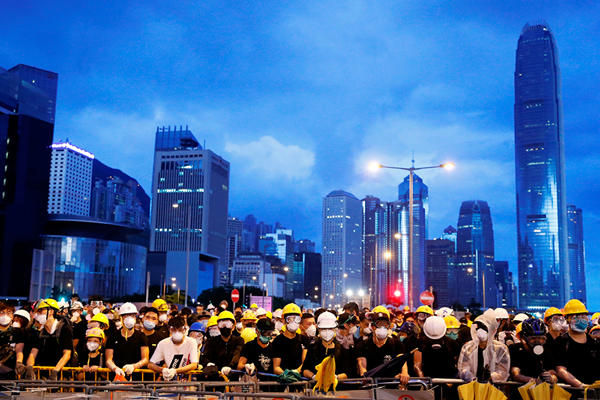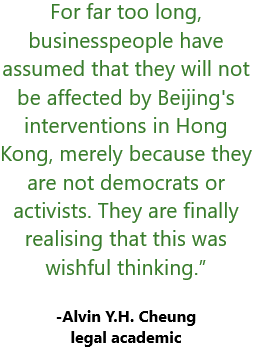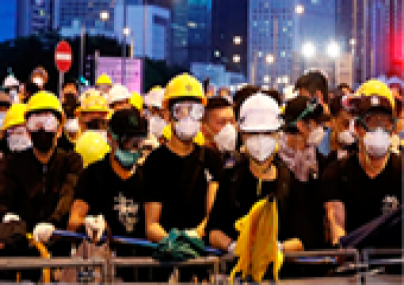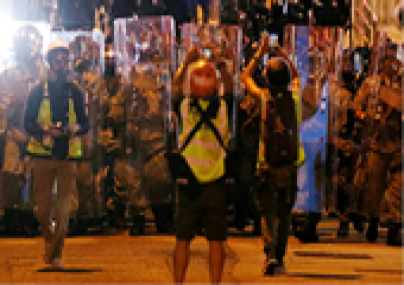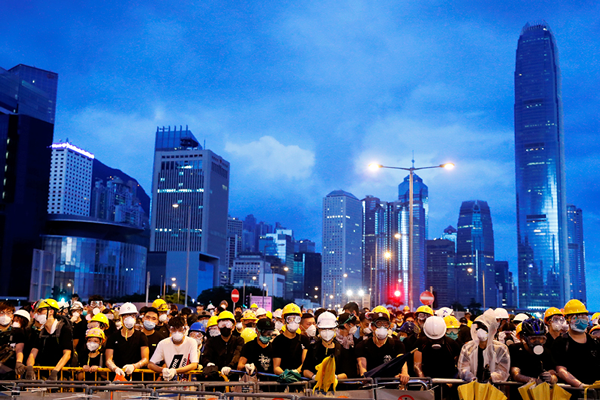
Tear gas, political tears and massive protest marches – Hong Kong saw it all after the city government tried to pass a controversial extradition law. While human rights remained the focal point for most protestors, lawyers and businesses are also alarmed at the recent turn of events, and many feel the city has taken a hit to its broader reputation that it might never be able to recover from.
Mass protests, rubber bullets, tear gas, well-timed tears from chief executive Carrie Lam, hunger strikes, and lawyers arguing with police. This is what government officials got when they attempted to usher in a now postponed bill that would enable the transfer of fugitives between Hong Kong and mainland China.
The bill, which lawyers have argued lacks human rights considerations of other common law jurisdictions’ extradition arrangements, initially underwent several changes to appease vocally concerned businesses and legal community that argued it was a threat to Hong Kong’s common law system, and to its citizens. Now Lam has suspended the bill, and apologized, but demonstrators are calling for it to be withdrawn and for her to step down.
An estimated one million protesters took to the streets Sunday, June 9, to air their concerns, followed by hundreds of thousands of protesters on subsequent days. The following Sunday, the turnout was close to two million, organizers estimate. Lawyers were a part of the protests: Some local firms offered pro bono services to demonstrators, while an organization called the Progressive Lawyers Group advised protesters of their rights and posted resources online.
BREACHING THE FIREWALL
Philip Dykes SC, chairman of the Hong Kong Bar Association, said the bill represents “breaching of the firewall which was established 20-odd years ago between the mainland system and our system,” noting that Hong Kong people have concerns “the criminal justice system in the mainland is opaque, has been described as capricious, and liable to be manipulated by parties standing behind prosecutions.”
These same concerns drove some 3000 legal professionals out onto the streets to silently protest the bill. Lawyers in Hong Kong rarely demonstrate, but the proposed bill was enough to send them onto the streets, sweltering in dark suits in the middle of summer.
A lawyer at a UK-headquartered international firm told ALB during the march that the demonstrations were a direct reaction to “a lack of confidence in the mainland legal system.”
“The bill is really awful -- disastrous. I’ve read the draft and its totally unacceptable,” said another marcher, a counsel with a local firm, who added that the legal process in mainland China was vastly different from that of Hong Kong’s.
“They can arbitrarily arrest people… It’s also retrospectively [enforced]. In common law you don’t have retrospective effect, but in China, they can arrest you for something you might have done years ago… I don’t trust the Chinese government… the trials aren’t to our standards,” the counsel said.
When asked about the impact this may have on business confidence, the counsel added: “The safest way is not living in Hong Kong… even if you’re passing through as a visitor. Hong Kong will become a scary place.”
BUSINESS IMPACT
Unease around the bill, high-profile protests and aggressive police responses have also had a gloomy impact on Hong Kong’s business outlook. Stocks in the city plummeted following mass protests and only began to recover after the postponement of the bill. Meanwhile, anxiety has also rocked the business community. The American Chamber of Commerce has consistently voiced concerns over the bill, releasing several statements urging the government to drop the bill and restore business confidence.
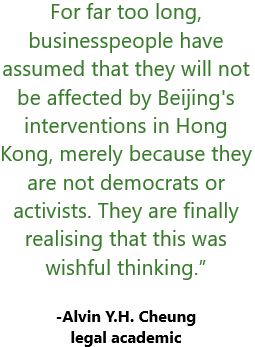 Michael Vidler, who runs his solicitors’ firm, Vidler & Co., in Hong Kong said the law could be applied to those who work in key sectors of the city’s business advisory community including the banking, accountancy and corporate legal sectors.
Michael Vidler, who runs his solicitors’ firm, Vidler & Co., in Hong Kong said the law could be applied to those who work in key sectors of the city’s business advisory community including the banking, accountancy and corporate legal sectors.
“It is not far-fetched to imagine that if mainland clients or business partners become ensnared in a corruption investigation or a business deal fails, then the bankers who arranged the loans to the PRC entity, or the accountants who audited the accounts, or the corporate lawyers who advised the individuals or corporation on the deals, could be dragged into the investigation or dispute and find themselves the subject of an extradition under the catch-all aiding, abetting, counselling and procuring provisions applicable to the fraud, false accounting, embezzlement and forgery offences covered by the legislation. This is regardless of whether they had engaged in wrongdoing or not,” Vidler said.
It seems that high-net-worth individuals are also contemplating these possibilities. According to Reuters, a number of Hong Kong tycoons had started moving their personal wealth offshore, particularly to places like Singapore.
Germany, U.K officials and U.S. Secretary of State Mike Pompeo have also warned that Hong Kong’s special status would be jeopardized should it push through the bill. The possibility that these countries could re-evaluate their economic relationships with the city has further jolted Hong Kong’s business community.
Given the potentially dire outcomes, international businesses have also subtly protested. A number of multinational firms, including Deloitte and HSBC, allowed their staff flexible working hours on June 12, coinciding with calls for a strike in the city. This marked a stark contrast with the Occupy Central movement in 2014, which saw the Big Four accounting firms release a joint anti-Occupy public statement.
“There is now a long-overdue reckoning, within the business community, of the parlous state of ‘One Country, Two Systems’ in Hong Kong,” legal academic Alvin Y. H. Cheung told ALB. “For far too long, businesspeople have assumed that they will not be affected by Beijing's interventions in Hong Kong, merely because they are not democrats or activists. They are finally realising that this was wishful thinking – years after they should have spoken up.”
Hong Kong Judges See Risks in Proposed Extradition Changes
Some Hong Kong judges fear they are being put on a collision course with Beijing as the special administrative region’s government pushes for sweeping legal changes that would for the first time allow fugitives captured in Hong Kong to be sent to mainland China for trial.
Three senior judges and 12 leading commercial and criminal lawyers say the changes, called the Fugitive Offenders Ordinance amendment bill, mark one of the starkest challenges to Hong Kong’s legal system and are increasingly troubling its business, political and diplomatic communities.
It is the first time judges - who by convention don’t comment on political or legislative matters - have discussed the issue publicly.
The city’s independent legal system was guaranteed under the laws governing Hong Kong’s return from British to Chinese rule 22 years ago and is seen by the financial hub’s business and diplomatic communities as its strongest remaining asset amid encroachments from Beijing. Hong Kong’s extensive autonomy is guaranteed until 2047.
The judges and lawyers say that under Hong Kong’s British-based common law system, extraditions are based on the presumption of a fair trial and humane punishment in the receiving country – a core trust they say China’s Communist Party-controlled legal system has not earned.
“These amendments ignore the importance of that trust - and in the case of the mainland, it simply doesn’t exist,” one highly experienced judge told Reuters on condition of anonymity because of the sensitivity of the matter.
“Many of us see this as unworkable,” the judge said. “And we are deeply disturbed.”
To contact the editorial team, please email ALBEditor@thomsonreuters.com.
